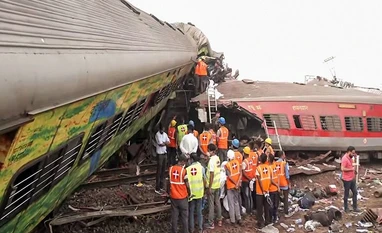A pile of wrecked coaches near Bahanaga Bazar railway station in Odisha's Balasore district serves as a grim reminder of the world's deadliest triple train tragedy which claimed nearly 300 lives and left over 1,200 people injured.
Despite six months having passed since the incident on June 2, it remains vivid in the minds of people travelling along the Kolkata-Chennai route.
The accident involved three trains - Coromandel Express, Yeshwantpur-Howrah SuperFast Express and a stationary goods train.
The administration's biggest challenge was identification of bodies as they were mutilated and beyond recognition.
In a first for train accidents, the government conducted DNA sampling of bodies, comparing them with DNA samples of claimants' relatives.
The year also saw the murder of cabinet minister Naba Kishore Das by a policeman on January 29. ASI Gopal Das was arrested and trial is underway.
More From This Section
Odisha politics revolved around VK Pandian, a 2000-batch IAS officer, who became one of the most controversial bureaucrats in the state's history. He was accused of gaining control over both the government and the ruling Biju Janata Dal (BJD) headed by Chief Minister Naveen Patnaik.
BJD MLA and editor of Odisha's leading daily Soumya Ranjan Patnaik had to pay a heavy price for opposing Pandian. He was expelled from the party and his media organisation came under the scanner of the Economic Offence Wing (EOW).
Finally, Soumya Ranjan Patnaik had to resign from his post as the founder editor of the daily. Following this, the issue subdued.
Pandian, who finally opted for voluntary retirement from the civil services on October 23, was appointed as the chairman of the state's 5T (transformational initiative) and Nabin Odisha scheme. This appointment was made within hours of his retirement, granting him the status of a cabinet minister.
On November 27, Pandian joined the BJD.
As the year drew to a close, Pandian was again embroiled in a controversy over allegations of him facilitating the entry of social media influencer Kamiya Jani into the 12th century Shree Jagannath temple.
Jani was accused of being a "beef eater and promoter of the beef consumption."
Though Jani has claimed to be a practicing Hindu and has never consumed beef in her life or even promoted it, the opposition BJP and Congress targeted Pandian for allowing her, thereby hurting religious sentiments of the people.
The year also witnessed bonhomie between the ruling BJD and opposition BJP as Chief Minister Naveen Patnaik gave the Modi government 8 out of 10 marks.
However, as the year comes to an end and the 2024 general elections and state polls approaching, both the opposition parties are adopting an aggressive stand against the BJD government.
The BJP, which is often accused of being in cahoots with Naveen Patnaik, has now intensified its attack on the BJD government ahead of the twin polls.
Patnaik for the second time in his 5th term, reshuffled his ministry by changing the portfolios of three ministers.
Speaker B K Arukha was appointed as finance minister while labour minister Srikant Sahu and mass education minister Samir Ranjan Dash were dropped from the ministry. Two senior leaders, Sudam Marni and Sarada Prasad Nayak, were inducted into the ministry.
In a historic moment, Odisha witnessed Pramila Mallik becoming the first woman Speaker of the Assembly. Unfortunately, two former speakers, Maheswar Mohanty and Surjya Narayan Patro, passed away this year.
Patnaik's elder sister Gita Mehta and prominent English poet Jayant Das were among prominent persons who died in 2023.
The state also witnessed a change in the leadership of opposition BJP. Senior leader Manmohan Samal was selected as Odisha BJP chief while the AICC appointed Ajoy Kumar as its new Odisha in-charge replacing A Chella Kumar.
In February, the state got a new chief secretary Pradeep Kumar Jena.
The cabinet's decision regarding transfer of tribal lands to non-tribals received a major setback with people from different sections opposing it.
The proposed amendment to Regulation-2 of 1956 (The Odisha Scheduled Areas Transfer of Immovable Property (By Scheduled Tribes) Regulation, 1956) was discussed in a cabinet meeting on November 14. The amendment pertaining to transfer of tribal lands was put on hold, causing a major embarrassment to the BJD government.
Odisha also got a new Governor in Raghubar Das, who replaced Prof Ganeshi Lal following completion of his tenure. Das was a former Jharkhand chief minister.
Odisha-born President Droupadi Murmu made at least three tours to her home state, once in July and twice in November.
The state again hit headlines when cocaine worth Rs 220 crore was seized from a ship at Paradip port. The ship, MV Debi, arrived from Egypt and was scheduled to depart for Denmark.
)